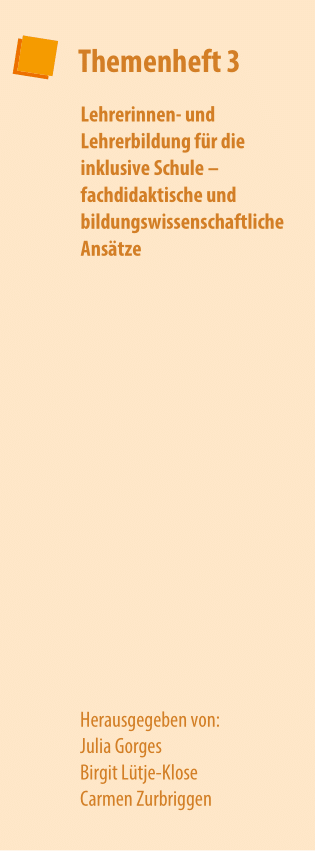Is this good inclusive teaching?
With video analyses and school oberservations from theory to practice reflection
DOI:
https://doi.org/10.4119/hlz-2462Keywords:
Inclusive teaching, video, school observation, obervation grid, interdisciplinary, subjective theories, teacher beliefsAbstract
In the article, a seminar concept is theoretically and didactically de-rived. Its aim is to promote student’s professional vision towards inclusive teaching. The interdisciplinary seminar focuses on good inclusive teaching from the perspectives of pedagogical psychology, school pedagogy, and special education. Two teachers from two of the three disciplines are teaching the seminar and integrate the third perspective. In a first step, the students work out their subjective theories about good inclusive teaching. The subjective theories are confronted with theories and research results of the three disciplines involved. On the basis of the theoretical inputs, the students develop a grid for observing inclusive teaching. Parts of the grid will be tested and further developed on the basis of videos. Finally, the grid is used for observations in “good practice” schools. In a concluding booster session, the grid is reflected on the background of the experiences gained during the observations.
Downloads
-
Abstract3035
-
Beitrag 2697
-
Online-Supplement 1 - Seminarplan mit Literatur und Videoliste 0
-
Online-Supplement 2 - Urteilsraster 0
Published
How to Cite
Issue
Section
License
Copyright (c) 2019 Ann-Christin Faix, Birgit Lütje-Klose, Annette Textor, Elke Wild

This work is licensed under a Creative Commons Attribution-ShareAlike 4.0 International License.
Sämtliche Inhalte der HLZ werden freigegeben unter der Creative-Commons-Lizenz Namensnennung, Weitergabe unter gleichen Bedingungen, Version 4.0 International (CC BY-SA 4.0). Die Urheber_innen und die Rechteinhaber_innen der in der HLZ veröffentlichten Beiträge gewähren grundsätzlich allen Nutzer_innen unwiderruflich das freie, weltweite Zugangsrecht zu diesen Veröffentlichungen. Unter der Bedingung, dass Autor_innen und Herausgeber_innen gemäß der Zitationshinweise sowie die Lizenz als »Lizenz: CC BY-SA 4.0« einschließlich der untenstehenden Lizenz-URL genannt werden, dürfen die Beiträge der HLZ vervielfältigt, weitergereicht und auf beliebige Weise genutzt werden, auch kommerziell und ebenso online wie in gedruckter oder anderer Form. Auch die Bearbeitung ist erlaubt unter der zusätzlichen Bedingung, dass das neu entstandene Werk als Bearbeitung gekennzeichnet wird und im Falle einer Veröffentlichung unter derselben Lizenz wie in der HLZ freigegeben wird.





